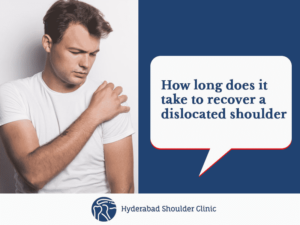Do you think you are all ready for your shoulder arthroscopy surgery? Maybe you know everything you need to know about your day of surgery, and that’s great! But did you think about post-surgery?
From the moment you wake up post-surgery and feel 100 per cent like yourself again, you are in the recovery phase. It’s okay if you don’t know exactly what’s coming right now, but if your surgery is coming up soon, now is the time to prepare for it. You don’t want to wake up from surgery, not knowing how the recovery will be.
The speed and pain associated with recovery after shoulder arthroscopic surgery depend on many factors, like the type of surgery, post-surgery complications, rehabilitation exercises, and physiotherapy, etc. Regardless of whether you have minimally invasive rotator cuff surgery or shoulder manipulation, recovery from shoulder surgery takes time.
Here are some tips provided by Dr Chandra Sekhar. B to help you recover from shoulder surgery as quickly as possible. First, knowing about arthroscopy for shoulder problems is helpful.
What is shoulder arthroscopy?

Shoulder arthroscopy is a minimally invasive surgery in which the shoulder cartilage, ligament, or rotator cuff is visible and repaired with a small optical camera called scope. Arthro means joint, which is how the procedure got its name arthroscope.
These unique camera components include a small lens, light source, and camera and recorder. The arthroscope is connected to a television camera, which projects the image onto a larger screen so that the surgeon can see the tissues and joints of the shoulder.
When is shoulder arthroscopy recommended?

Your doctor may recommend shoulder arthroscopy if you have a painful condition that doesn’t respond to non-surgical treatment. Non-surgical treatments include rest, physical therapy, and medications or injections that can reduce inflammation and allow healing of injured tissue. Inflammation is one of your body’s standard responses to injury or disease. In an injured or sore shoulder joint, inflammation causes swelling, pain, and stiffness.
Injuries, overuse, and age-related wear are responsible for most shoulder problems. Shoulder arthroscopy can relieve pain symptoms from many problems that damage the rotator cuff tendons, labrum, articular cartilage, and other soft tissues surrounding the joint. Standard arthroscopic procedures include:
- Rotator cuff repair
- repair of the labrum for recurrent shoulder dislocation
- Repair of ligaments
- Removal of inflamed tissue or loose cartilage
Less common procedures such as loose body removal, few fracture repair, and cyst removal can also be performed with an arthroscope. Some surgical procedures, such as shoulder replacement, still require open surgery with a wider incision.
What should you expect?

Surgery is a stressful experience for many people, but knowing what to expect can relieve some of those worries. Here are the steps you need to know.
- Preoperative Clearance: Before surgery, your doctor will perform tests to ensure you are fit enough to undergo surgery. Additional testing may be required depending on your general conditions. Your doctor will discuss the risks associated with surgery and give you any preoperative instructions you may need, such as medications, do’s, and don’t’ before the procedure.
- Day of surgery: On the day of surgery, you should avoid eating or drinking anything after midnight.
- Anaesthesia: After being in the operating room, the anaesthetist will prescribe a general anaesthetic, a combination of drugs that will put you to sleep during surgery. You won’t feel anything. The anaesthetist can also administer a nerve block that numbs the shoulder. The nerve blocking continues after the surgery so you feel no pain until anaesthesia wears off
- Postoperative Recovery: You wake up in the hospital’s postoperative recovery area. You may feel nauseated after the anaesthesia. This is entirely normal and will go away. Most arthroscopy repairs are done on an outpatient basis to go home the same day as your procedure.
What to expect Immediately after the surgery:

- You may feel a little unstable after surgery. If you feel dizzy and tired, don’t worry and don’t stress yourself. Relaxation is what your body needs most. It would be best if you didn’t try to get out of bed quickly.
- The good news is that you shouldn’t feel any pain thanks to medicines, but the anaesthetic may make you feel a little nauseous. It happens to several people, so if you do experience this, DO not worry.
- You will feel comfortable enough to walk at some point, but don’t make the mistake of believing that you can manoeuvre as quickly as you did before the operation. Dressing and standing will be a little tricky at first, but you won’t feel any pain, and it will get easier over time.
- Whatever you do, be sure to take pain medication before the nerve blockers go away.
- It is normal to experience swelling and discomfort in the shoulder a few days or a week after surgery. Ice should be applied every hour or two for 20 to 30 minutes. Place a light towel or t-shirt next to your skin when using ice in a plastic bag. Applying ice is most important during the first 48 hours, although many people feel that ice’s continued use will reduce postoperative pain.
- If you have a nerve block, a local anaesthetic can numb your shoulder for several hours. When you leave the hospital, you will be prescribed strong pain relievers. If you find that you didn’t receive it well, contact the doctor. Many patients find that lying down increases their discomfort. You can sleep better in an armchair or bed. A pillow behind your elbows can also help.
- Keep postoperative dressings clean and dry. Unless the swelling makes it wet or too tight, leave the bandage in place for at least two days. Remove the bandage two days after surgery. Cover the incisions with tape to protect the threads from the clothes. Then you can shower, but try to keep the wound dry for the first 10-14 days. Do not immediately wet the incision (shower or swim) for at least two weeks.
- The sutures are absorbable and don’t have to be removed.
- The doctor recommends going back to the office 10-14 days after surgery. If you haven’t planned your first postoperative visit, please contact the hospital and have an appointment.
- Start your postoperative rehabilitation/physiotherapy right away. Your physical therapy program is the key to success; this should start the day after surgery. A separate recipe describes the protocol. Often it helps to call before surgery to schedule an appointment with your physical therapist. Pump your hands and move your writing and your elbows to help keep blood flowing and prevent stiffness.
- Be in adult care
- Don’t drink alcohol or smoke.
- You can eat regular food if you are not breastfeeding. Drink lots of non-alcoholic and decaffeinated fluids.
- Don’t make important decisions or sign any legal documents.
- Plan a few days off.
How can you deal with postoperative pain and discomfort?

Pain management is one of the patient’s main concerns after surgery. Anaesthesia and nerve blocks will help with the pain on the day of the surgery, but you are responsible for managing your pain once you get home. Your care team will help prepare you to return home to begin the recovery process. Here are some things you can do to feel comfortable after surgery.
- Ice: Putting an ice pack on your shoulder at all times can help relieve pain and reduce swelling. When freezing, be careful not to wet the incision area. Wrap a thin towel around the ice and hold it to your shoulder for about 20 minutes at a time.
- Medication: Your doctor may prescribe pain medication for you. You can also try various over-the-counter medications for pain relief. We recommend that you consult your doctor before taking pain relievers. Some medicines can affect bleeding, while others can interact with your doctor’s prescription. Always follow directions carefully when taking any medication.
- Sleep: Sleep is an essential part of recovery, but it can be a challenge immediately after surgery. It can take up to six weeks after surgery to get a good night’s sleep in a horizontal position. It may be easier for you to sleep in a lounge chair. Alternatively, you can use a pillow to support yourself on the bed. Make sure to support the sore arm up and away from your body. If you prefer to sleep on your side, you can sleep on the other shoulder.
What can you expect from postoperative physiotherapy?
Physical therapy is an essential part of postoperative care with shoulder pain. Your physiotherapist will first introduce passive movements in the shoulder. They will gently move your arms to ensure that the recovering muscles and tendons are not subjected to undue stress. When you are ready, your physical therapy will shift to active movement, meaning your therapist will instruct you to move your arms. Finally, start strengthening your shoulders with resistance training. Even though you have regular physical therapy appointments, your therapist will likely provide you with daily home exercises. Rotator cuff rehabilitation usually continues for at least a few months after surgery.
How long will it take to recover from rotator cuff surgery?

Recovery takes place in different phases. The first step is to treat postoperative pain. Although your arm is unlikely to move in the sling for four to six weeks after surgery, you can return to most of your normal activities within a few days of surgery. You can drive and go, but remember that you are going to do these things one-handed. During your recovery period, you will work with a physical therapist to restore movement and strengthen it. The schedule for shoulder surgery recovery can vary from case to case, but full recovery usually takes four to six months. It may take longer to get back into the heavy lift. Talk to your doctor and physical therapist before resuming sports or returning to work that puts a lot of pressure on your shoulders.
Conclusion:
After you have fully recovered, you may want to erase your mind’s injury and move on with your life. It allows you to return to the activities you enjoy. However, it would be best if you took care to avoid re-injury to the shoulder.
If you experience shoulder pain, it’s time to make an appointment at Hyderabad
Shoulder Clinic. Dr Chandra Skehar. B determine the cause of your pain and develop an individual treatment plan. Our employees are devoted to personal care at our patient-oriented clinic, from assessment to diagnosis and treatment.
If you need an evaluation for a shoulder, schedule an appointment from Dr Chandra Skehar. B online or call at 9959588389. Take the first steps toward recovery today.





